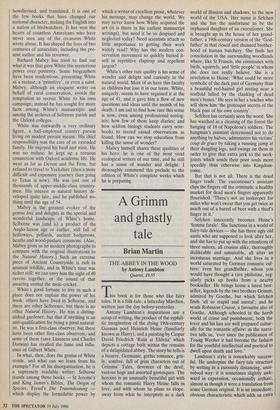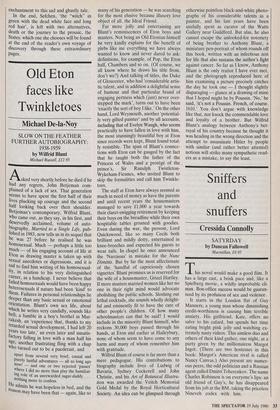A Grimm and ghastly tale
Brian Martin
THE ABBEY IN THE WOOD by Antony Lambton Quartet, f9.95 This book is for those who like fairy tales. It is a folk-tale, a latterday Marchen, written just the day before-yesterday.
Antony Lambton's inspirations are a scrap of writing, the product of the syphili- tic imagination of the dying 19th-century German poet Heinrich Heine (familiarly known as Harry), and a painting by Caspar David Friedrich 'Ruin at Eldena' which depicts a cottage built within the remains of a delapidated abbey. The story he tells is a bizarre, Germanic, gothic romance, gris- ly, sombre, full of grim characters out of Grimms' Tales, devotees of the devil, various hags and assorted grotesques. The heroine is an unusually beautiful girl with whom the romantic Harry Heine falls in love, and with whom he plans to elope, away from what he interprets as a dark world of illusion and shadows, to the new world of the USA. Her name is Sefchen and she has the misfortune to be the orphaned daughter of an executioner. She is brought up in the house of her grand- father, a 19th-century version of the 'God- father' in that closed and shunned brother- hood of human butchery. She finds her consolation in the surrounding woodlands where, like St Francis, she communes with birds, squirrels, and 'little people' in whom she does not really believe. She is a revelation to Heine: 'What could be more symbolic of the dark past of Germany than a beautiful red-haired girl resting near a scaffold lulled by the clanking of dead men's bones.' He sees in her a teacher who will show him 'the grotesque secrets of the black past of his own country'.
Sefchen has certainly seen the worst. She has watched in a clearing of the forest the hanging of 18 of Napoleon's soldiers. The hangmen's assistant determined not to do anything by halves, administers his victims' coup de grace by taking a running jump at their dangling legs, and swings on them in order to give that extra jerk to the neck- joints which sends their poor souls more speedily than otherwise into Kingdom- come.
But that is not all. There is the dried finger trade. The executioner's assistant clips the fingers off the criminals: a healthy market for dead men's fingers apparently flourished. 'There's not an innkeeper for miles who won't swear that you get twice as much out of a barrel of beer with a thief's finger in it.'
Sefchen innocently becomes Heine's `femme fatale'. She functions in a world of fairy-tale devices — she has three ugly old aunts who are supposed to look after her, and she has to put up with the attentions of three suitors, all cousins alike, thoroughly dislikeable and unsuitable, all after an incestuous marriage. And she lives in a world saturated by German romantic cul- ture: even her grandfather, whom you would have thought a rare philistine, reg- ularly picks up books from a nearby bookseller. He brings home a latest best- seller, legends by the two brothers Grimm, admired by Goethe, but which Sefchen finds 'all so stupid and unreal'; and he reads Robinson Crusoe, a favourite also of Goethe. Although schooled in the harsh world of crime and punishment, both the lover and his lass are well prepared cultur- ally for the romantic affaire: as the narra- tive tells us, 'ever since the publication of Young Werther it had become the fashion for the youthful intellectual and poetical to dwell upon death and love.'
Lambton's style is remarkably success- ful. He underpins the fairy-tale structure by writing in a curiously distancing, unin- volved way: it is sometimes slightly awk- ward in expression, occasionally archaic, almost as though it were a translation from some German original. It is an immediate, obvious characteristic which adds an extra enchantment to this sad and ghastly tale.
In the end, Sefchen, `the "witch" in green with the dead white face and long red hair', is left with two alternatives, death or the journey to the prosaic, the States: which one she chooses will be found at the end of the reader's own voyage of discovery through these extraordinary pages.



















































 Previous page
Previous page